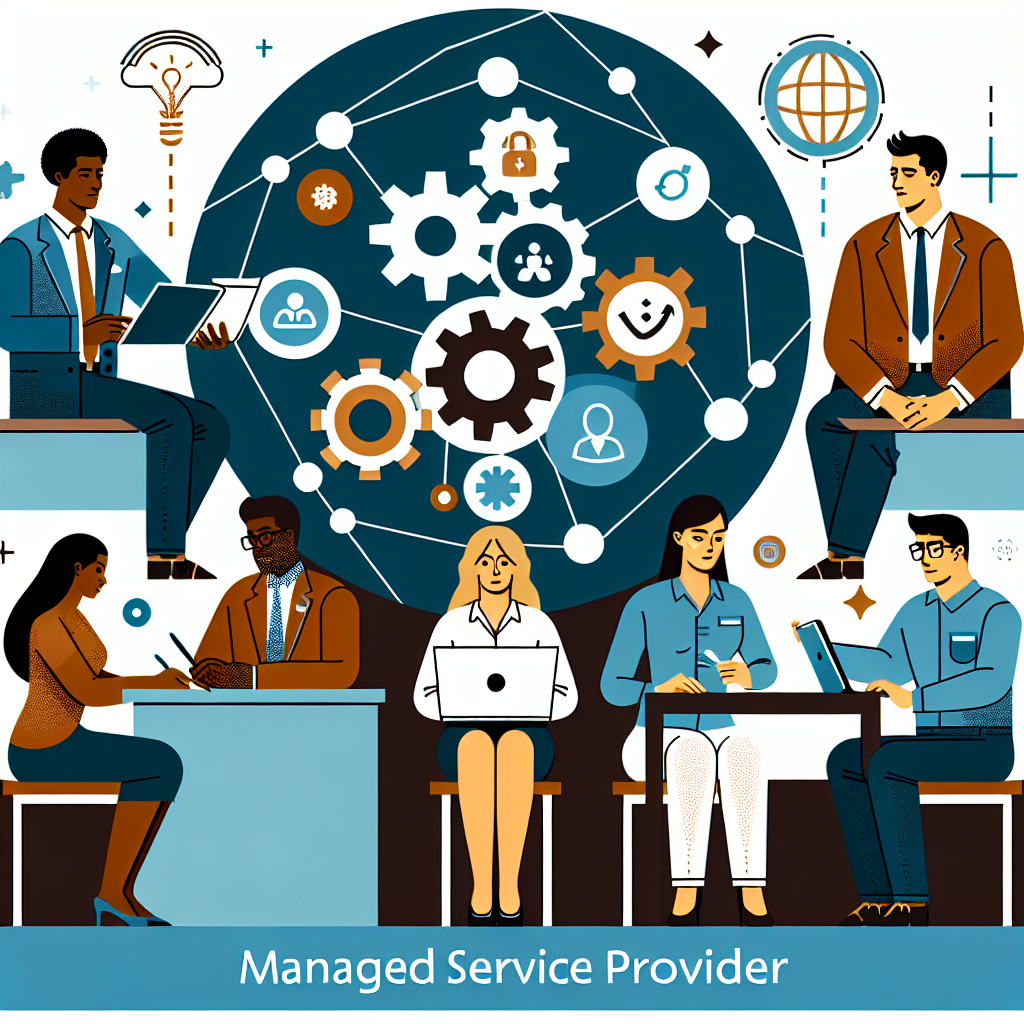Your cart is currently empty!
Tag: Businesses

Maximizing ROI with Managed Service Providers: A Guide for Small Businesses
In today’s fast-paced business world, small businesses are constantly looking for ways to maximize their return on investment (ROI). One way to do this is by utilizing managed service providers (MSPs) to handle various aspects of their IT infrastructure.MSPs are third-party companies that provide a range of IT services to businesses, including network monitoring, data backup and security, and software management. By outsourcing these tasks to an MSP, small businesses can free up time and resources to focus on core business activities, while also benefiting from the expertise and resources of a dedicated IT team.
But how can small businesses ensure they are getting the most out of their investment in an MSP? Here are some tips for maximizing ROI with managed service providers:
1. Define your goals: Before partnering with an MSP, it’s important to clearly define your business goals and objectives. This will help you determine which services you need from an MSP and how they can help you achieve your goals.
2. Evaluate your current IT infrastructure: Take stock of your current IT systems and processes to identify areas where an MSP could provide value. This could include improving network security, streamlining software updates, or enhancing data backup and recovery processes.
3. Choose the right MSP: When selecting an MSP, it’s important to do your research and choose a provider that aligns with your business needs and goals. Look for an MSP with experience working with small businesses in your industry, and make sure they offer the services you need at a price that fits your budget.
4. Communicate effectively: Building a strong relationship with your MSP is key to maximizing ROI. Keep lines of communication open, provide clear feedback on their services, and work together to address any issues that arise.
5. Monitor performance: Regularly monitor the performance of your MSP to ensure they are delivering on their promises. Keep track of key metrics such as network uptime, response times, and security incidents to gauge the effectiveness of their services.
6. Continuously improve: Work with your MSP to identify areas for improvement and implement changes to optimize your IT infrastructure. By continuously evaluating and refining your partnership with an MSP, you can ensure you are getting the most out of your investment.
Overall, partnering with an MSP can be a cost-effective way for small businesses to enhance their IT capabilities and maximize ROI. By following these tips, small businesses can build a successful partnership with an MSP that helps them achieve their business goals and drive growth.

Disaster Recovery Strategies for Businesses: How to Stay Prepared
Disasters can strike at any time, and businesses need to be prepared in order to minimize the impact of these events on their operations. Whether it’s a natural disaster like a hurricane or earthquake, or a man-made disaster like a cyberattack or data breach, having a solid disaster recovery plan in place is essential for businesses of all sizes.Here are some key strategies for businesses to stay prepared in the face of a disaster:
1. Identify Risks: The first step in creating a disaster recovery plan is to identify the potential risks that your business faces. This could include natural disasters, such as floods, fires, or earthquakes, as well as man-made disasters like cyberattacks or data breaches. By understanding the risks, you can better prepare for them and develop a plan to mitigate their impact.
2. Create a Plan: Once you have identified the risks, it’s important to create a comprehensive disaster recovery plan. This should outline the steps that your business will take in the event of a disaster, including how you will communicate with employees, customers, and suppliers, how you will secure your data and systems, and how you will continue to operate during and after the disaster.
3. Backup Data: One of the most important aspects of a disaster recovery plan is backing up your data. This includes both on-site and off-site backups, so that you can quickly restore your data in the event of a disaster. Regularly backing up your data and testing your backups is essential to ensure that you can quickly recover from a disaster.
4. Secure Your Systems: In addition to backing up your data, it’s important to secure your systems to prevent cyberattacks and data breaches. This includes implementing strong passwords, regularly updating software and security patches, and training employees on cybersecurity best practices.
5. Test Your Plan: Once you have created a disaster recovery plan, it’s important to regularly test it to ensure that it will work in the event of a disaster. This could include running simulations of various disaster scenarios, testing your backups, and conducting drills with employees to ensure that everyone knows their roles and responsibilities.
By following these strategies, businesses can stay prepared in the face of a disaster and minimize the impact on their operations. Being proactive and having a solid disaster recovery plan in place can give businesses the confidence that they can quickly recover from a disaster and continue to serve their customers.

Navigating the Complexities of IT Management: How MSPs Simplify the Process for Businesses
Navigating the complexities of IT management can be a daunting task for businesses of all sizes. With the rapidly changing landscape of technology, it can be challenging to keep up with the latest trends and developments in IT. This is where Managed Service Providers (MSPs) come in to simplify the process for businesses and help them navigate the complexities of IT management.MSPs are third-party companies that provide a range of IT services to businesses, including network management, cybersecurity, cloud computing, and data backup, among others. By outsourcing these services to an MSP, businesses can benefit from the expertise and resources of a team of IT professionals without the need to hire and manage an in-house IT department.
One of the primary ways MSPs simplify the IT management process for businesses is by providing proactive monitoring and maintenance of their IT systems. MSPs use advanced monitoring tools to keep track of a business’s network, servers, and devices in real-time, allowing them to identify and address potential issues before they escalate into major problems. This proactive approach helps businesses avoid costly downtime and ensures that their IT systems are running smoothly and efficiently.
Additionally, MSPs can help businesses navigate the complexities of cybersecurity by implementing robust security measures to protect their data and systems from cyber threats. With the increasing frequency of cyber attacks and data breaches, it is essential for businesses to have strong cybersecurity measures in place to safeguard their sensitive information. MSPs can provide services such as firewall management, intrusion detection, and vulnerability assessments to help businesses strengthen their cybersecurity defenses and mitigate the risk of a security breach.
Furthermore, MSPs can assist businesses in leveraging the power of cloud computing to streamline their IT operations and improve efficiency. By migrating their data and applications to the cloud, businesses can benefit from increased scalability, flexibility, and cost savings. MSPs can help businesses assess their cloud computing needs, select the right cloud services provider, and manage their cloud infrastructure to ensure optimal performance and security.
In conclusion, navigating the complexities of IT management can be a challenging task for businesses, but MSPs can simplify the process by providing a range of IT services tailored to meet their specific needs. By outsourcing their IT management to an MSP, businesses can benefit from expert support, proactive monitoring, and comprehensive security measures to keep their IT systems running smoothly and securely. With the help of an MSP, businesses can focus on their core operations and leave the complexities of IT management to the experts.

How IT Solutions Can Help Small Businesses Compete with Larger Companies
In today’s competitive business landscape, small businesses often struggle to keep up with larger companies that have more resources and manpower. However, with the right IT solutions in place, small businesses can level the playing field and compete effectively with their larger counterparts.One of the key advantages that IT solutions offer small businesses is increased efficiency. By automating repetitive tasks and streamlining processes, small businesses can save time and resources that can be better utilized in other areas of the business. For example, cloud-based project management tools can help small businesses collaborate more effectively, while customer relationship management (CRM) software can help them better understand and engage with their customers.
Additionally, IT solutions can help small businesses improve their customer service and enhance the overall customer experience. For instance, chatbots and virtual assistants can provide round-the-clock support to customers, while data analytics tools can help small businesses better understand their customers’ preferences and behavior. By leveraging IT solutions, small businesses can personalize their interactions with customers and provide a more tailored experience that can help them stand out in a crowded marketplace.
Furthermore, IT solutions can help small businesses better manage their finances and resources. Accounting software can help small businesses track expenses, manage invoices, and generate financial reports, while inventory management tools can help them optimize their supply chain and reduce costs. By having a clear picture of their financial health and resources, small businesses can make more informed decisions that can help them grow and compete with larger companies.
Lastly, IT solutions can help small businesses stay agile and adapt to changing market conditions. With the rise of e-commerce and digital marketing, small businesses need to be able to quickly respond to market trends and customer demands. By leveraging IT solutions such as e-commerce platforms and digital marketing tools, small businesses can reach a wider audience and stay ahead of the competition.
In conclusion, IT solutions can be a game-changer for small businesses looking to compete with larger companies. By increasing efficiency, improving customer service, managing finances, and staying agile, small businesses can level the playing field and thrive in today’s competitive business landscape. Investing in the right IT solutions can help small businesses not only survive but thrive in the long run.

Top Trends in Managed Services: What Businesses Need to Know
Managed services have become an integral part of modern businesses, allowing companies to outsource IT tasks and focus on their core competencies. As technology continues to evolve, so do managed services, with new trends shaping the industry. Here are the top trends in managed services that businesses need to know about:1. Artificial Intelligence and Machine Learning: AI and machine learning are revolutionizing managed services by enabling predictive maintenance, automated troubleshooting, and improved security measures. These technologies can analyze large amounts of data to identify patterns and anomalies, allowing businesses to proactively address issues before they impact operations.
2. Cloud Computing: Cloud computing has become a popular choice for businesses looking to scale their IT infrastructure without the need for costly hardware investments. Managed service providers are increasingly offering cloud services, allowing businesses to access their data and applications from anywhere, at any time.
3. Cybersecurity: With the rise of cyber threats, cybersecurity has become a top priority for businesses of all sizes. Managed service providers are now offering advanced security solutions, such as intrusion detection and prevention, vulnerability assessment, and threat intelligence, to protect businesses from cyber attacks.
4. IoT Management: The Internet of Things (IoT) has transformed the way businesses operate, with connected devices collecting and transmitting data in real-time. Managed service providers are now offering IoT management services to help businesses monitor and manage their IoT devices, ensuring they operate efficiently and securely.
5. Remote Work Solutions: The COVID-19 pandemic has accelerated the shift towards remote work, with businesses relying on managed services to support their remote workforce. Managed service providers are offering solutions such as virtual desktop infrastructure, secure remote access, and collaboration tools to help businesses adapt to the new work environment.
6. Compliance and Regulation: With increasing regulations around data privacy and security, businesses need to ensure they are compliant with industry standards and regulations. Managed service providers are offering compliance management services to help businesses navigate complex regulatory requirements and avoid costly fines.
7. Managed Backup and Disaster Recovery: Data loss can have a devastating impact on businesses, leading to downtime, lost revenue, and damage to reputation. Managed service providers are offering backup and disaster recovery solutions to help businesses protect their data and quickly recover in the event of a disaster.
In conclusion, the managed services industry is constantly evolving to meet the changing needs of businesses. By staying informed about the latest trends and partnering with a reputable managed service provider, businesses can leverage technology to drive innovation, improve efficiency, and stay ahead of the competition.

Why Small Businesses Should Consider Partnering with a Managed Service Provider
Small businesses often face numerous challenges when it comes to managing their IT infrastructure. Limited resources, lack of expertise, and the need to focus on core business activities can make it difficult for small businesses to effectively manage their technology needs. This is where partnering with a managed service provider (MSP) can be extremely beneficial.An MSP is a third-party company that manages a business’s IT infrastructure and services on a proactive basis, rather than waiting for something to break. By partnering with an MSP, small businesses can access a wide range of IT services and expertise without the need to hire and train in-house IT staff.
One of the key reasons why small businesses should consider partnering with an MSP is cost savings. By outsourcing their IT needs to an MSP, small businesses can reduce costs associated with hiring and training IT staff, purchasing and maintaining hardware and software, and dealing with unexpected IT issues. MSPs typically offer a range of pricing options, including flat-rate monthly fees, which can help small businesses better budget for their IT expenses.
Additionally, partnering with an MSP can help small businesses improve their overall IT security. MSPs have the expertise and resources to implement and maintain robust security measures, such as firewalls, antivirus software, and data encryption, to protect a business’s sensitive information from cyber threats. This is especially important for small businesses, as they are often targeted by cybercriminals due to their perceived lack of security measures.
Another reason why small businesses should consider partnering with an MSP is the ability to access the latest technology and IT solutions. MSPs are constantly updating their skills and knowledge to stay ahead of the curve when it comes to new technologies and trends. By partnering with an MSP, small businesses can benefit from access to cutting-edge IT solutions that can help them improve productivity, efficiency, and competitiveness.
Furthermore, partnering with an MSP can help small businesses improve their overall IT performance and reliability. MSPs proactively monitor and maintain a business’s IT infrastructure to prevent issues before they occur, minimizing downtime and disruptions to business operations. This can help small businesses maintain a high level of productivity and customer satisfaction.
In conclusion, partnering with a managed service provider can offer numerous benefits for small businesses, including cost savings, improved security, access to the latest technology, and enhanced IT performance and reliability. By outsourcing their IT needs to an MSP, small businesses can focus on what they do best – running and growing their business – while leaving their IT needs in the hands of experts.

Case Studies: How Managed Services Have Transformed Businesses
In today’s fast-paced, technology-driven world, businesses are constantly seeking ways to stay ahead of the competition and adapt to changing market trends. One of the key ways that companies are transforming their operations is through the use of managed services.Managed services involve outsourcing certain business functions to a third-party provider, who then takes on the responsibility of managing and overseeing those functions. This can include IT services, human resources, marketing, and more. By leveraging the expertise and resources of a managed services provider, businesses are able to streamline their operations, reduce costs, and focus on their core business objectives.
Case studies have shown how managed services have transformed businesses across various industries. For example, a manufacturing company was struggling with outdated IT infrastructure and inefficient processes. By partnering with a managed services provider, they were able to modernize their systems, improve data security, and increase productivity. This resulted in cost savings and improved customer satisfaction.
In another case study, a small business in the hospitality industry was looking to expand their operations but didn’t have the resources or expertise to handle their growing IT needs. By outsourcing their IT services to a managed services provider, they were able to scale their operations, improve their online presence, and better serve their customers. This allowed them to focus on growing their business without the burden of managing IT issues.
Overall, the use of managed services has proven to be a game-changer for businesses looking to stay competitive in today’s digital economy. By outsourcing non-core functions to experts, companies can improve efficiency, reduce costs, and focus on driving innovation and growth. As technology continues to evolve, more businesses are likely to turn to managed services to help them navigate the complexities of the modern business landscape.

Ensuring Business Continuity: Best Practices for Small Businesses
In today’s fast-paced and ever-changing business environment, it is crucial for small businesses to have a plan in place to ensure business continuity in the face of unexpected disruptions. Whether it be a natural disaster, cyber-attack, or pandemic, having a solid plan in place can help small businesses navigate through challenging times and minimize the impact on their operations.Here are some best practices for small businesses to ensure business continuity:
1. Develop a Business Continuity Plan (BCP): Every small business should have a BCP in place that outlines how the business will continue to operate in the event of a disruption. This plan should identify key business processes, critical assets, and potential risks, as well as outline specific steps to take to mitigate those risks and ensure business continuity.
2. Identify key stakeholders: It is important for small businesses to identify key stakeholders, both internal and external, who will be involved in the business continuity process. This includes employees, customers, suppliers, and other partners who play a critical role in the business’s operations.
3. Implement a robust IT infrastructure: In today’s digital age, having a secure and reliable IT infrastructure is essential for small businesses to ensure business continuity. This includes regularly backing up data, implementing cybersecurity measures, and having a plan in place to restore systems and data in the event of a cyber-attack or other IT disruption.
4. Cross-train employees: Cross-training employees on key business processes and tasks can help ensure that the business can continue to operate smoothly even if key personnel are unavailable due to a disruption. This can help minimize downtime and ensure that critical tasks are still being completed.
5. Communicate with stakeholders: Effective communication is key during a business disruption. Small businesses should have a communication plan in place to keep employees, customers, suppliers, and other stakeholders informed about the situation and any changes to operations. This can help maintain trust and confidence in the business during challenging times.
6. Test and update the BCP regularly: It is important for small businesses to regularly test and update their BCP to ensure that it remains relevant and effective. This can help identify any gaps or weaknesses in the plan and allow the business to make necessary adjustments to improve its business continuity strategy.
By following these best practices, small businesses can better prepare for and navigate through unexpected disruptions, ensuring that they can continue to operate and thrive in the face of adversity. Implementing a solid business continuity plan can help small businesses protect their operations, employees, and reputation, and ultimately increase their chances of long-term success.

Cost Savings and Beyond: The Benefits of IT Outsourcing for Businesses
In today’s fast-paced and competitive business environment, companies are constantly looking for ways to cut costs and increase efficiency. One popular solution that many businesses are turning to is IT outsourcing. By outsourcing their IT functions to third-party service providers, companies can not only save money but also benefit from a wide range of other advantages.One of the most obvious benefits of IT outsourcing is cost savings. By outsourcing their IT services, companies can eliminate the need to hire and train in-house IT staff, which can be expensive and time-consuming. Outsourcing also allows businesses to access a team of skilled professionals at a fraction of the cost of hiring full-time employees. Additionally, outsourcing IT services can help companies reduce operational costs, such as hardware and software expenses, as well as overhead costs like office space and utilities.
But cost savings are just the tip of the iceberg when it comes to the benefits of IT outsourcing. Outsourcing IT services can also help businesses improve their overall efficiency and productivity. By entrusting their IT functions to experienced professionals, companies can focus on their core business activities and strategic goals, rather than getting bogged down in technical details. This can lead to increased productivity, faster decision-making, and ultimately, improved business performance.
Furthermore, outsourcing IT services can also help businesses stay ahead of the curve when it comes to technology. IT outsourcing providers are constantly updating their skills and knowledge to stay abreast of the latest technological developments. By outsourcing their IT functions, companies can leverage the expertise of these professionals to implement cutting-edge technologies and solutions that can give them a competitive edge in the market.
Another benefit of IT outsourcing is enhanced security and risk management. IT outsourcing providers are well-versed in the latest cybersecurity threats and best practices for protecting sensitive data. By outsourcing their IT functions, companies can rest assured that their systems and data are being managed and monitored by experts who are dedicated to keeping them safe from cyberattacks and other security risks.
In conclusion, IT outsourcing offers a wide range of benefits for businesses beyond just cost savings. From increased efficiency and productivity to access to the latest technologies and enhanced security, outsourcing IT services can help companies streamline their operations, reduce risks, and stay ahead of the competition. For businesses looking to cut costs and improve their overall performance, IT outsourcing is definitely worth considering.

Top Data Backup Solutions for Small Businesses
In today’s digital age, data is one of the most valuable assets for businesses of all sizes. However, small businesses often overlook the importance of data backup and recovery until it’s too late. Data loss can be devastating for a small business, leading to lost revenue, damaged reputation, and even closure. That’s why it’s crucial for small businesses to invest in reliable data backup solutions to protect their valuable information.Here are some of the top data backup solutions for small businesses:
1. Cloud Backup Services: Cloud backup services offer a convenient and cost-effective solution for small businesses to backup their data securely. With cloud backup, data is stored offsite in secure data centers, protecting it from physical disasters such as fires or floods. Cloud backup services also provide automatic backups, so you don’t have to worry about remembering to back up your data regularly.
2. External Hard Drives: External hard drives are a simple and affordable data backup solution for small businesses. You can manually back up your data to an external hard drive on a regular basis, or use software that automatically backs up your data at scheduled intervals. External hard drives are portable and easy to use, making them a popular choice for small businesses with limited IT resources.
3. Network Attached Storage (NAS): NAS devices are another popular data backup solution for small businesses. NAS devices connect to your network and provide a centralized storage solution for backing up data from multiple devices. NAS devices offer features such as RAID (Redundant Array of Independent Disks) for data redundancy and protection against drive failures.
4. Backup Software: Backup software is a crucial component of any data backup strategy. Backup software automates the backup process, making it easy to schedule regular backups and restore data quickly in the event of a data loss. Many backup software solutions offer features such as encryption, compression, and deduplication to optimize storage space and protect sensitive data.
5. Hybrid Backup Solutions: Hybrid backup solutions combine the benefits of on-premises and cloud backup to provide a comprehensive data protection strategy. With hybrid backup, you can backup your data locally to a NAS device or external hard drive, and also replicate your data to the cloud for offsite protection. Hybrid backup solutions offer the flexibility and scalability to meet the data backup needs of small businesses.
In conclusion, data backup is a critical component of a small business’s IT strategy. Investing in reliable data backup solutions can help protect your business from the devastating consequences of data loss. Whether you choose cloud backup services, external hard drives, NAS devices, backup software, or hybrid backup solutions, it’s essential to have a data backup plan in place to safeguard your valuable information. Don’t wait until it’s too late – start backing up your data today!
